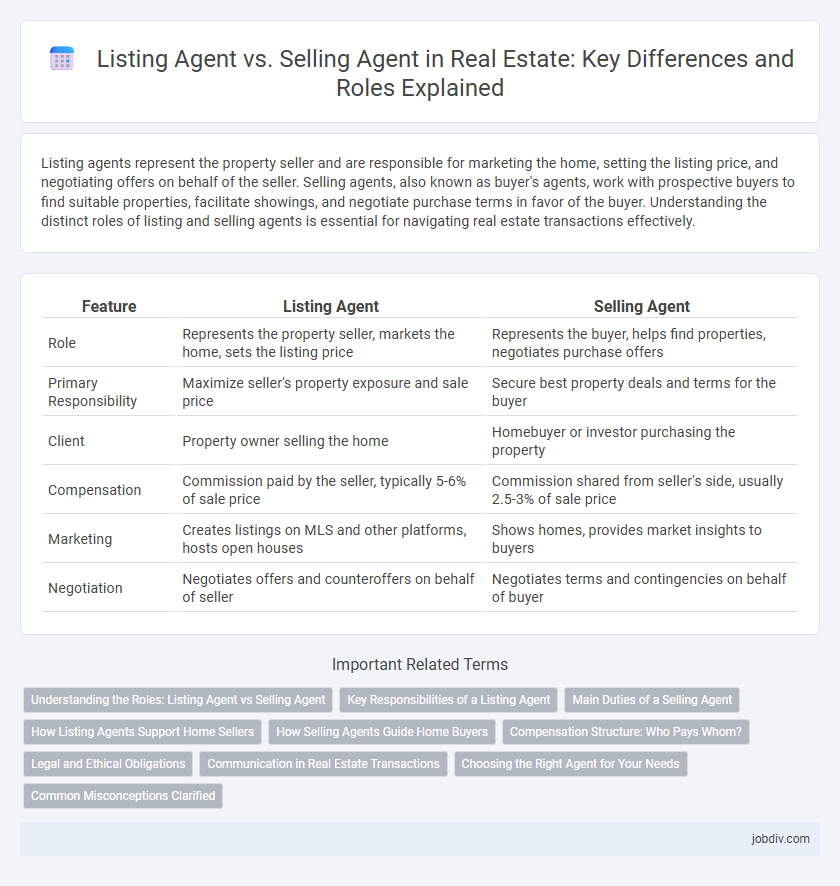Listing agents represent the property seller and are responsible for marketing the home, setting the listing price, and negotiating offers on behalf of the seller. Selling agents, also known as buyer's agents, work with prospective buyers to find suitable properties, facilitate showings, and negotiate purchase terms in favor of the buyer. Understanding the distinct roles of listing and selling agents is essential for navigating real estate transactions effectively.
Table of Comparison
| Feature | Listing Agent | Selling Agent |
|---|---|---|
| Role | Represents the property seller, markets the home, sets the listing price | Represents the buyer, helps find properties, negotiates purchase offers |
| Primary Responsibility | Maximize seller's property exposure and sale price | Secure best property deals and terms for the buyer |
| Client | Property owner selling the home | Homebuyer or investor purchasing the property |
| Compensation | Commission paid by the seller, typically 5-6% of sale price | Commission shared from seller's side, usually 2.5-3% of sale price |
| Marketing | Creates listings on MLS and other platforms, hosts open houses | Shows homes, provides market insights to buyers |
| Negotiation | Negotiates offers and counteroffers on behalf of seller | Negotiates terms and contingencies on behalf of buyer |
Understanding the Roles: Listing Agent vs Selling Agent
A listing agent represents the property owner, handling the marketing, pricing, and negotiation to sell the home, while a selling agent works on behalf of the buyer, helping them find suitable properties and facilitating purchase offers. Both agents play crucial roles in real estate transactions by ensuring smooth communication and advocating for their respective clients' interests. Understanding these distinct responsibilities helps clients navigate the buying or selling process more effectively and ensures clarity during negotiations.
Key Responsibilities of a Listing Agent
A Listing Agent is responsible for marketing a property, setting a competitive price, and coordinating property showings to attract potential buyers. They conduct market analysis, prepare necessary documentation such as disclosure forms, and negotiate offers on behalf of the seller. Their expertise helps maximize the property's exposure and ensures a smooth transaction from listing to closing.
Main Duties of a Selling Agent
A selling agent, also known as the buyer's agent, primarily focuses on representing the buyer's interests throughout the real estate transaction. Their main duties include finding properties that match the buyer's criteria, arranging showings, conducting market analyses, and negotiating purchase offers to secure the best possible terms. They also guide buyers through the inspection process, financing options, and closing procedures to ensure a smooth and informed purchase experience.
How Listing Agents Support Home Sellers
Listing agents play a crucial role in supporting home sellers by conducting comprehensive market analyses to set competitive prices that attract potential buyers. They manage all marketing efforts, including professional photography, online listings, and open houses, to maximize property visibility. Additionally, listing agents handle negotiations and coordinate with buyers' agents to ensure a smooth transaction process and achieve the best possible sale price for the seller.
How Selling Agents Guide Home Buyers
Selling agents play a critical role in guiding home buyers through the purchasing process by providing expert advice on market trends, property values, and negotiation strategies. They help buyers identify suitable properties, arrange showings, and assess the condition and potential of homes to ensure informed decision-making. By managing paperwork and coordinating with other professionals, selling agents facilitate a smoother transaction from offer to closing.
Compensation Structure: Who Pays Whom?
In real estate transactions, the listing agent is compensated through a commission typically paid by the seller, which is a percentage of the property's sale price. The selling agent, also known as the buyer's agent, usually receives a portion of this commission, split from the listing agent's total fee. This commission structure aligns incentives, ensuring both agents work collaboratively to close the sale efficiently.
Legal and Ethical Obligations
Listing agents have a fiduciary duty to act in the best interests of the seller, ensuring full disclosure of all offers and material facts, while maintaining confidentiality throughout the transaction. Selling agents owe a similar ethical obligation to the buyer, providing honest representation, transparent communication, and due diligence in verifying property details. Both agents must comply with real estate laws and brokerage policies to avoid conflicts of interest and uphold professional standards in every phase of the sale.
Communication in Real Estate Transactions
Effective communication in real estate transactions hinges on the roles of the listing agent and selling agent, who must coordinate to provide accurate property information and negotiate terms. The listing agent represents the seller, managing property presentation and disclosures, while the selling agent advocates for the buyer's interests and facilitates offer submissions. Clear, timely communication between both agents ensures smooth transaction progress and minimizes misunderstandings that could delay closing.
Choosing the Right Agent for Your Needs
Selecting the right agent depends on your specific role in the real estate transaction: a listing agent represents the seller and markets the property, while a selling agent works on behalf of the buyer to find and negotiate the purchase. Expertise in local market trends, negotiation skills, and communication effectiveness are critical factors when choosing between a listing agent versus a selling agent. Understanding your priorities--whether maximizing sale price or securing favorable purchase terms--helps ensure alignment with the agent best suited to your needs.
Common Misconceptions Clarified
Listing agents represent the seller and are responsible for marketing and pricing the property, while selling agents work with buyers to find suitable properties and negotiate offers. A common misconception is that the selling agent only shows homes and has no fiduciary duty, but selling agents also owe a duty of care and must act in the buyer's best interest. Understanding the different roles and obligations of listing and selling agents helps clarify the real estate transaction process and avoid conflicts.
Listing Agent vs Selling Agent Infographic

 jobdiv.com
jobdiv.com